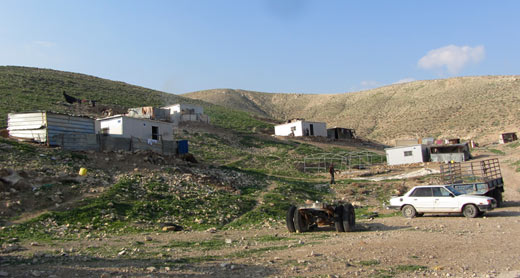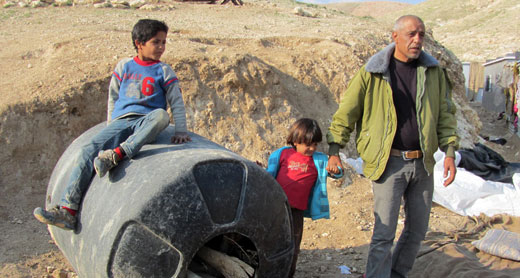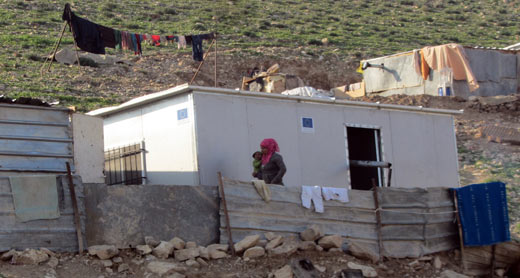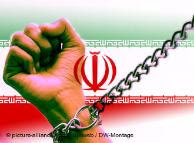Civil Administration serves eviction orders to al-Ka’abneh community near Wadi Qelt, West Bank
B'Tselem בצלם a ajouté une photo.
Published:
22 Jan 2015 Homes in the al-Ka’abneh community. Photo: 'Amer al-Aruri, B'Tselem, 18 Jan. 2015. Click on photo to enlarge
Homes in the al-Ka’abneh community. Photo: 'Amer al-Aruri, B'Tselem, 18 Jan. 2015. Click on photo to enlarge
On 12 January 2015, Civil Administration representatives, accompanied by Border Police officers, arrived at the small community of al-Ka’abneh near Wadi Qelt in the West Bank. They took photographs of the prefabricated temporary dwellings that are home to the community’s 15 families and threw into each one an eviction order for “recent incursion into state land”. The orders stipulated that the residents must evacuate within 48 hours. Members of the community turned to Att. Shlomo Lecker, who filed an objection on their behalf with the Civil Administration.
The al-Ka’abneh community, originally from the Negev, has lived at its current location since 1983. They were expelled from the Negev after the state of Israel was established in 1948 and initially moved to the Hebron area, in the West Bank. They have been living in the Ma’ale Adumim area, also in the West Bank, for decades. The authorities have evicted them from their sites twice so that settlements could be built there – first, the settlement of Kfar Adumim, and then the settlement of Mizpe Yericho.
Since their eviction from in the location of Mizpe Yericho in 1983, the community has lived at its current site near Wadi Qelt, a fact that renders the claim of “recent incursion into state land” baseless. According to community leader Muhammad Ka’abneh, 43, there are some 60 people in the community half of them children. In late December 2014, the European Union provided each family with a prefabricated temporary dwelling to replace their ramshackle shacks.
 Community leader Muhammad Ka’abneh and two of his sons. Photo: 'Amer al-Aruri, B'Tselem, 18 Jan. 2015. Click on photo to enlarge
Community leader Muhammad Ka’abneh and two of his sons. Photo: 'Amer al-Aruri, B'Tselem, 18 Jan. 2015. Click on photo to enlarge
The community is not recognized by the state and has never been connected to power and water grids. Residents have no choice but to purchase water in containers, and some have obtained solar panels to generate electricity. The only paved access roads to the community are roads leading into the Wadi Qelt nature reserve, which is gated off after dark. Once these roads are closed, the only way in and out of the community is a dangerous drive along rocky hills. Consequently, the community has no access to medical attention after dark.
Once a month, a mobile clinic run by the Al-Islah organization visits the community and provides residents with basic medical services. The children are driven to school in Jericho in buses supplied by the Palestinian Authority.
 A resident on the al-Ka’abneh community next to one of the prefabricated temporary dwellings provided by the EU. Photo: 'Amer al-Aruri, B'Tselem, 18 Jan. 2015. Click on photo to enlarge
A resident on the al-Ka’abneh community next to one of the prefabricated temporary dwellings provided by the EU. Photo: 'Amer al-Aruri, B'Tselem, 18 Jan. 2015. Click on photo to enlarge
The community used to rely on shepherding for a living. After the abovementioned settlements were established and many grazing areas were declared firing zones, they could no longer sustain this occupation and sold their flocks. Now, they earn a living from street vending and selling handmade artifacts to visitors at the Waqi Qelt nature reserve.
The al-Ka’abneh community is one of more than 20 Bedouin communities (some 3,000 people) living in the Ma’ale Adumim area. For years, the Civil Administration has initiated and pursued plans to evict these communities and concentrate them elsewhere, in sites chosen by the Administration. In the 1990s, dozens of families were evicted and resettled in a site the Administration organized near the Abu Dis landfill; a plan to transfer 200 more families to the site is on hold, following a petition to Israel’s High Court of Justice.
The new eviction orders and the other steps mentioned above are part of the concerted efforts various authorities have been making for decades to expel thousands of Palestinians in dozens of communities throughout Area C from their homes, under a range of pretenses. Israeli officials have repeatedly declared an intention to take over land in Area C in order to create “facts on the ground” that will facilitate annexation to Israel in a future peace agreement and, until then, de-facto annexation. In recent years, the Civil Administration has been planning a permanent site for Bedouin communities from the Ma’ale Adumim area and from the Jericho area in the Jordan Valley, to be called “Ramat Nu’eimah”. The plan is being drawn up with no input from the residents themselves, who oppose it. The demand that the al-Ka’abneh families leave their homes within 48 hours is absurd, given that at present, they have nowhere else to go.
The Civil Administration’s plan contravenes IHL, which prohibits the forcible transfer of protected persons for any reason other than their own security or imperative military needs. Even then, the transfer must be temporary. Clearly, the al-Ka’abneh community eviction fails to meet these terms. Israeli authorities, as representatives of the occupying power in the West Bank, also have an obligation to act in a manner that benefits the residents of the occupied territory and promotes their welfare. The plan to evict residents from their homes and force some of them into living conditions that are detrimental to their livelihood breaches this obligation, and is clearly intended to promote political interests that are entirely unrelated to the occupying power’s duties.
The Civil Administration must cancel the plans for establishing “Ramat Nu’eimah” and similar sites. It must enable Bedouin communities to maintain their lifestyle, plan their communities, and build homes legally. It must also connect them to infrastructure and provide them with basic health and education services.







هیچ نظری موجود نیست:
ارسال یک نظر